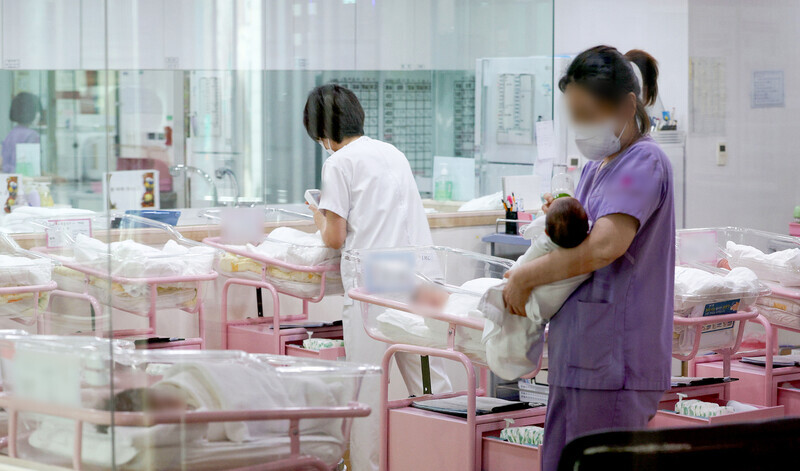hankyoreh
Links to other country sites 다른 나라 사이트 링크
[Editorial] When the choice is kids or career, Korea will never overcome birth rate woes

Since Korea’s backward labor market stubbornly refuses to allow workers to balance their work and family obligations, women continue to suffer a “childbirth penalty” that has a major impact on Korea’s plunging birth rate, a new study has found. It’s absurd to expect the birth rate to rebound as long as people’s careers are derailed by having children.
A report published by the Korea Development Institute on Tuesday included a comparison of the rate of career interruption among women with children and women without children. The career interruption rate among 30-something women without children fell sharply from 28% in 2015 to 9% in 2023, while among their peers with children, that rate declined more modestly over the same period (from 29% to 24%). The upshot is that women can substantially reduce the risk of career interruption by choosing not to have children.
Korea is the only OECD member state where the birth rate is less than one child per woman. The Korean birth rate has been dropping by about 0.07 each year since 2015 (1.24), falling to 0.72 last year. That’s quite different from the average birth rate among OECD member states over the same period (2015–2021), which has only decreased by about 0.017 births per year.
Researchers have focused on the fact that more women are opting not to have children as the childbirth penalty has increased along with women’s employment. That’s thought to account for around 40% of the decrease in the birth rate between 2013 and 2019.
Ultimately, it’s unreasonable to expect the birth rate to rebound as long as the burden of housework and child care falls on women. Until men and women can agree to split those responsibilities evenly, there’s little hope of altering a work culture of unlimited competition that’s basically predicated on not having children.
According to a survey of families held by the Ministry of Gender Equality and Family in 2023, the percentage of respondents who said the wife “mostly” or “generally” handles the housework was 73.3%, actually higher than in the survey three years before (70.5%). That has some significant implications for what the government’s fertility programs should focus on going forward.
Korea needs to encourage more fathers to make use of child care leave, considering that the rate here is lower than in other advanced economies. We need measures to increase the efficiency of childcare leave, such as making leave automatic. But before policymakers start churning out pro forma proposals, they need to seriously consider how the low birth rate is impacted by gender inequality.
President Yoon Suk-yeol’s fertility policy has been criticized for disregarding gender equality. We won’t get an effective prescription until we have an accurate diagnosis of the problem.
Please direct questions or comments to [english@hani.co.kr]

Editorial・opinion
![[Guest essay] Maybe Korea’s rapid population decline is an opportunity, not a crisis [Guest essay] Maybe Korea’s rapid population decline is an opportunity, not a crisis](https://flexible.img.hani.co.kr/flexible/normal/500/300/imgdb/original/2024/0430/9417144634983596.jpg) [Guest essay] Maybe Korea’s rapid population decline is an opportunity, not a crisis
[Guest essay] Maybe Korea’s rapid population decline is an opportunity, not a crisis![[Column] Can Yoon steer diplomacy with Russia, China back on track? [Column] Can Yoon steer diplomacy with Russia, China back on track?](https://flexible.img.hani.co.kr/flexible/normal/500/300/imgdb/original/2024/0430/1617144616798244.jpg) [Column] Can Yoon steer diplomacy with Russia, China back on track?
[Column] Can Yoon steer diplomacy with Russia, China back on track?- [Column] Season 2 of special prosecutor probe may be coming to Korea soon
- [Column] Park Geun-hye déjà vu in Yoon Suk-yeol
- [Editorial] New weight of N. Korea’s nuclear threats makes dialogue all the more urgent
- [Guest essay] The real reason Korea’s new right wants to dub Rhee a founding father
- [Column] ‘Choson’: Is it time we start referring to N. Korea in its own terms?
- [Editorial] Japan’s rewriting of history with Korea has gone too far
- [Column] The president’s questionable capacity for dialogue
- [Column] Are chaebol firms just pizza pies for families to divvy up as they please?
Most viewed articles
- 1Dermatology, plastic surgery drove record medical tourism to Korea in 2023
- 2[Guest essay] Maybe Korea’s rapid population decline is an opportunity, not a crisis
- 3First meeting between Yoon, Lee in 2 years ends without compromise or agreement
- 4Under conservative chief, Korea’s TRC brands teenage wartime massacre victims as traitors
- 5Thursday to mark start of resignations by senior doctors amid standoff with government
- 6Months and months of overdue wages are pushing migrant workers in Korea into debt
- 7[Column] Can Yoon steer diplomacy with Russia, China back on track?
- 8AI is catching up with humans at a ‘shocking’ rate
- 9South Korea found the most ramen-eating country
- 1046% of cases of violence against women in Korea perpetrated by intimate partner, study finds